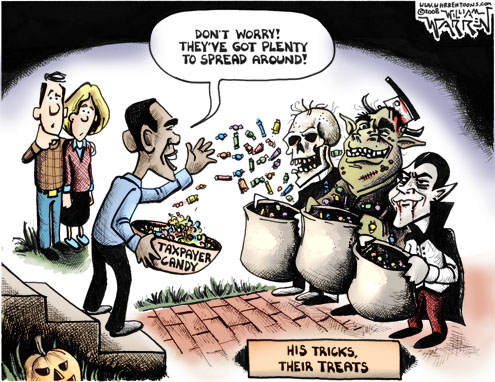By Bill Wilson
Reuters on Oct. 30 blared the headline “U.S. Treasury lashes out at Germany, says export dependence hurts global economy,” highlighting a new semiannual report to Congress from the Treasury’s Office of International Affairs urging trade surplus nations like Germany and China to increase domestic demand. Why?
The reasons vary. In the case of Germany, the “anemic pace of domestic demand growth and dependence on exports have hampered rebalancing at a time when many other euro-area countries have been under severe pressure to curb demand and compress imports in order to promote adjustment.”
Meanwhile, in China, apparently the problem is the yuan is not appreciating “as fast or by as much as is needed.” The implicit accusation there is that the Chinese are artificially devaluing their currency to boost exports, a familiar refrain on the presidential campaign trail.
When you boil it down, what you have is the U.S., which runs massive balance of payments deficits — $440.4 billion in 2012, and $203.7 billion so far in 2013 — attacking countries that run big surpluses. Wonkish financial analysts call this attempting to reduce so-called “global imbalances.”
In the process, we seem to ignore our own history in presuming to tell other countries they should not pursue surpluses — the very type of imbalance that led to the rise of the U.S. as a global economic force. From 1870 to 1914, massive capital flows and trade surpluses helped us to become the most prosperous nation in the world. It fueled the Industrial Revolution here and heralded the Gilded Age.
Who are we to tell other nations not to become prosperous by running big surpluses? Moreover, who cares?
For the uninitiated, balance of payments is the gauge of capital flowing out of the country as measured by the Bureau of Economic Analysis that includes the trade deficit, interest paid to foreigners on the national and corporate debt, and other items.
Apparently, the Office of International Affairs possesses special knowledge about what the “proper” flows of capital all over the world ought to be, despite the reality that the economy is billions of people making individual decisions about how to spend money.
The report itself requires the Treasury under the Omnibus Trade and Competitiveness Act of 1988 to highlight international and exchange rate policies and to consider “whether countries manipulate the rate of exchange between their currency and the United States dollar for purposes of preventing effective balance of payments adjustment or gaining unfair competitive advantage in international trade.”
Yet, the report found “no major trading partner of the United States met the standard of manipulating the rate of exchange between their currency and the United States dollar.”
So, what are we complaining about? And besides, just how, exactly, is a country like Germany supposed to “promote stronger levels of demand support”? Issue credit cards to citizens? Finance a few million risky low-income loans for housing?
Meanwhile, the report is forced to admit that “global current account imbalances have declined in recent years, but much of the decline reflects a contraction in demand on the part of current account deficit countries” like the U.S. In 2006, the balance of payments deficit peaked at $798.4 billion, and as noted above fell to $440.4 billion in 2012.
This is the icing on the cake. The Obama administration is complaining Germany and China need to increase domestic demand, and in the meantime, we cannot boost demand ourselves here by the report’s own admission, despite $3 trillion of monetary stimulus, and trillion dollar a year deficits since 2009.
But that’s not even the worst part.
It is the arrogant assertion that somehow the world just needs some sort of global economic plan. This is nothing more than a model of a few secluded central bankers, corporate interests, and faceless government bureaucrats believing they can dictate economic behavior on a global scale.
To wit, it states, “Achieving strong, sustainable, and balanced global growth requires further adjustments to occur across many different parts of the world.”
Meaning, more “stimulus” in Germany, more currency appreciation in China, and so forth.
In short, it’s not us. It’s them. Here’s an idea. Maybe we should worry about our own neck of the woods for a change.
For example, if we were really interested in reducing our own current account deficit, we might do something to lower the cost of doing business here, lower taxes, and reduce regulations that are driving business overseas. We might stop printing so much money, balance the budget, and figure out how to live within our means. We might start producing things here in America again.
Instead of complaining about Germany and China, maybe we should try competing with them for a change. What Treasury is promoting has almost nothing to do with the real economy of entrepreneurs where real innovation actually occurs. It just assumes that exchange rate tweaks, quantitative easing, government-sponsored finance, more “stimulus,” and more regulations are the answer.
This is all the end result of offering the U.S. dollar up as the world’s reserve currency. Because dollars are stockpiled all over the world as if they were as good as gold, demand is exceptionally high for our currency — and our debt. In order to meet the demand for dollars, we run huge deficits both fiscally and economically, blow up massive credit bubbles, and then dutifully fire up the printing press to keep the supply handy.
That is the primary cause of all these so-called “global imbalances,” the greatest currency manipulation of all that somehow has escaped the Treasury’s attention five years after the financial crisis began. One can only wonder how long it will take the Germans and Chinese to call us on it. Maybe it’s time we shut up and mind our own business.
Bill Wilson is a member of the board of directors of Americans for Limited Government.







